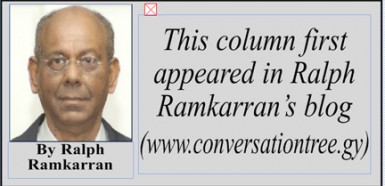
After the conclusion of the mandate of the Mixed Commission, the Governments of Guyana, Venezuela and the United Kingdom entered into an agreement known as the Port of Spain Protocol in June, 1970, which suspended the operation of Article IV of the Geneva Agreement for twelve years. This meant effectively that the formal search under Article IV for a resolution of the controversy was suspended for the period. Guyana and Venezuela undertook to “explore all possibilities of better understanding between them.”
The Protocol of Port of Spain came to an end in 1982 and was not renewed. The parties then agreed to refer the matter to the Secretary General of the United Nations who selected the Good Officer process under Article 33 of the United Nations Charter. He appointed then Vice Chancellor of the University of the West Indies, Sir Alister McIntyre, as the first of three Good Officers. Dr Barton Scotland, the current Speaker of the National Assembly, was the first Guyana Facilitator and discussions started around 1990. I replaced Dr Scotland in about 1994 and despite some fifteen years of discussions, no progress was made towards a solution. Even though the controversy was based on Venezuela’s contention that the Arbitral Award was “null and void,” its discourse always focused, not on what grounds the Arbitral Award should be set aside, but on acquiring a part of Guyana’s territory.
It eventually became clear to Guyana after fifty years of effort that the controversy could not be resolved by discussion and negotiation. A reference of the matter to the International Commission of Jurists, the World Court, appeared to be the only solution. Guyana prevailed upon the UN Secretary General to do so, as Venezuela would never have agreed. The UN Secretary General, Ban Ki Moon, agreed, but with a proviso that an enhanced Good Officer Process should continue for another year and that he would only refer the matter if there was no significant progress. The Good Officer Process did not produce significant progress and so the UN Secretary General referred the matter to the ICJ or World Court.
The Venezuelan Government has rejected the reference of the controversy to the ICJ on the ground that political negotiation under the Geneva Agreement is the only path to reach a peaceful, practical and satisfactory solution to the controversy. This interpretation ignores the fact that a means of settlement under Article 33 of the UN Charter which the UN Secretary General empowered to select under Article 1V(2) of the Geneva Agreement is “judicial settlement,” as stated above. A reference of the controversy to the ICJ is seeking a “judicial settlement.” But Guyana has grown accustomed to the weirdly partisan and blatantly incorrect interpretations of the Geneva Agreement by the Venezuelans who, for example, have consistently argued that Article V, which in fact preserves the status quo, awards the area of their claim west of the Essequibo River to them.
The Geneva Agreement, and the main issue over which the ICJ will have jurisdiction, is the validity of the Arbitral Award of 1899. It will not directly involve ownership of the territory. This is what Article 1 says: “A Mixed Commission shall be established with the task of seeking satisfactory solutions for the practical settlement of the controversy between Venezuela and the United Kingdom which has arisen as a result of the Venezuelan contention that the Arbitral Award of 1899 between British Guiana and Venezuela is null and void.”
Venezuela’s contention that the Arbitral Award is null and void is based on a claim a junior lawyer representing Venezuela at the hearing of the Arbitral Tribunal, Severo Mallet-Prevost, that the award was the result of a deal between the United Kingdom and Russia, in which the Russian Chair of the Tribunal, the distinguished jurist and writer, Dr Frederic Martens, had a hand. Mallet-Prevost made the allegation in a memorandum which was written when he was an old man, decades after the events, with no particulars of the alleged deal and, suspiciously, directed that it must not be opened until after his death.
This is the extent of Venezuela’s evidence against the validity of the Arbitral Award and the reason why it does not want a judicial light to shine on it.






